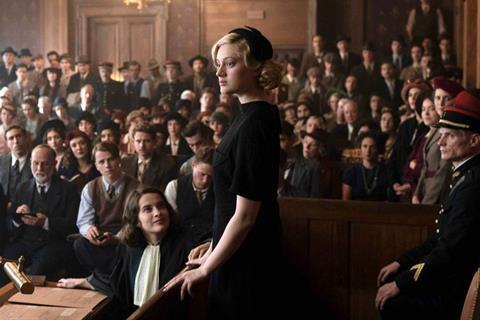Francois Ozon’s snappy adaptation of a 1934 stageplay is a ‘sly slice of feminist triumph’

Dir: François Ozon. France. 2023. 102 mins.
A willfully theatrical, proudly retro yet delectably pertinent confection, The Crime is Mine (Mon Crime) parlays mid-1930s Paris into a sly slice of feminist triumph against lecherous producers, self-serving legal authorities, cultural gatekeepers and the tendency to discard older women only to learn they likely harbor a few tricks up their sleeves. Several generations of France’s finest thespians are clearly enjoying themselves in this stylish tale of how notoriety — even for presumed murder — need not be the slightest impediment to social and professional rewards.
Surprisingly wholesome amoral romp
A surprisingly wholesome amoral romp, Francois Ozon’s 22nd film in 25 years has performed well since its French release (on March 8, Interntional Women’s Day). It will not exceed the impressive box office returns of Ozon’s two biggest femme-centric pictures also inspired by plays of yore — 8 Femmes and Potiche — but joyously reinforces the writer/director’s gift for providing actresses with a framework in which to excel.
Twenty-something blonde Madeleine Verdier (Nadia Tereskiewicz, Forever Young) is an actress, although there’s no reason to believe she’s a good one. At least not on stage or screen. But real life might be the motivation to catapult her and her brunette roommate Pauline (Rebecca Marder, omnipresent on screen in the past year) a recent law school graduate with no clients, into the financial independence they crave. For now, they are five months behind on the rent for their garret and suicide has not been ruled out as a solution.
The same day the landlord warns them of eviction, Madeline has returned from her meeting with a wealthy older producer, held at his snazzy moderne villa in the Paris suburbs. Which is where his lifeless body is found, shot dead.
An investigating magistrate (Fabrice Luchini, great pompous fun) believes Madeleine must be the murderer. He’d really love for her to be the guilty party because solving the crime so quickly would be good for his career. She confesses. Pleading self-defense on behalf of Madeline, Pauline shines in the media-titilating trial and the two formerly broke friends are the toast of Paris. Madeleine is starring in a hit play, Pauline is sought after as a lawyer. What could go wrong? Well, somebody claiming to be the real murderer could show up.
Former silent film star Odette Chaumette (Isabelle Huppert, imperiously hilarious) is extremely good at talking for somebody who didn’t have audible dialogue back when she was famous. Her delivery makes one want to reach for a stopwatch for the joy of clocking her speed.
At no point are Madeleine and Pauline rivals. Refreshingly, it is in the spirit of genuine sisterhood that they upend the system, bending sadly predictable patriarchal patterns to their advantage. A tad leisurely at first to accommodate the venture’s theatricality, the proceedings build a real head of steam, right down to the closing credits where newspaper headlines, one per character, add additional amusing tidbits.
Tereskiewicz and Marder are very good, Huppert couldn’t be better and Luchini, André Dussollier and — in an inspired bit of casting — Dany Boon (Welcome to the Sticks) get painted in and out of narrative corners with alacrity. Production design is top-notch and the instantly appealing faux-retro score by Philippe Rombi is a well-dosed treat.
Production companies: Mandarin & Compagnie, Foz
International sales: Playtime, info@playtime.group
Producers: Eric & Nicolas Altmayer
Screenplay: Francois Ozon, adapted, with Philippe Piazzo from the play Mon Crime (1934) by Georges Berr & Louis Verneuil
Cinematography: Manu Dacosse
Production design: Jean Rabasse
Editing: Laure Gardette
Music: Philippe Rombi
Main cast: Nadia Tereskiewicz, Rebecca Marder, Isabelle Huppert, Fabrice Luchini, André Dussollier, Dany Boon , Edouard Sulpice, Evelyne Buyle
























